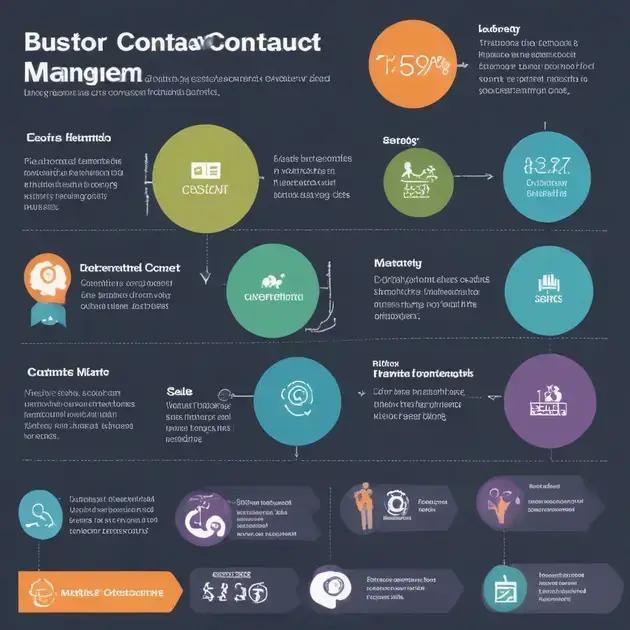Customer contact management involves organizing and analyzing customer interactions to enhance relationships and satisfaction. Utilizing CRM systems, AI, and omni-channel support establishes efficient communication and personalized experiences, positioning businesses for growth and improved customer loyalty.
Customer contact management is a crucial component for businesses aiming to enhance their interactions with clients. By employing effective strategies and tools, companies can streamline communication, improve relationships, and boost satisfaction levels. This post will delve into the essentials of customer contact management, outlining its benefits, tools, strategies for successful implementation, and upcoming trends that could influence your approach.
Understanding Customer Contact Management
Understanding customer contact management is essential for businesses that want to enhance their client interactions. It involves a systematic approach to handling customer information and communications. By organizing this data, businesses can provide personalized services and maintain strong relationships with their customers.
The Importance of Customer Contact Management
Effective customer contact management helps companies keep track of all customer interactions, preferences, and feedback. This leads to better customer insights, allowing businesses to tailor their services and products to meet individual needs. Satisfied customers are more likely to remain loyal and recommend the business to others.
Key Components of Customer Contact Management
Some key components include contact databases, tracking communication history, and automating follow-ups. A robust database is necessary for storing all relevant customer information, while tracking communication history allows for personalized interactions. Automation tools can help manage follow-ups without requiring manual effort.
Challenges in Customer Contact Management
One of the challenges in customer contact management is ensuring data accuracy. Keeping customer information up to date is vital to prevent miscommunication. Additionally, managing multiple channels of communication can be complex, requiring tools that integrate seamlessly to give a consistent experience.
How Technology Enhances Customer Contact Management
Technology plays a significant role in streamlining customer contact management. Software solutions such as Customer Relationship Management (CRM) systems provide businesses with tools to manage customer interactions efficiently. These tools can analyze data to improve customer understanding and enhance overall customer experience.
In conclusion, understanding customer contact management is crucial for any business aiming to build and maintain strong customer relationships. By leveraging technology and maintaining organized contact data, businesses can enhance their engagement strategies.
Benefits of Effective Customer Contact Management

Benefits of effective customer contact management are essential for businesses looking to grow and maintain strong relationships with their customers. By implementing a structured approach, companies can see significant improvements in several key areas.
Enhanced Customer Relationships
One of the primary benefits is the ability to strengthen customer relationships. When businesses effectively manage customer contact, they can personalize their communication and understand customer needs better. This leads to increased satisfaction and loyalty.
Increased Efficiency
Effective customer contact management improves efficiency in handling customer inquiries and issues. When information is organized, your team can respond faster to customer requests. This means less waiting time for customers, which can result in better overall satisfaction.
Better Decision Making
When businesses have access to comprehensive customer data, they can make informed decisions. Analyzing this data helps in identifying trends and understanding customer behavior. This, in turn, can lead to better marketing strategies and product development tailored to customer preferences.
Cost Savings
Implementing an effective customer contact management system can lead to cost savings by streamlining operations and reducing the time spent on manual tasks. Automating processes such as follow-ups or data entry helps minimize errors and lowers operational costs.
Improved Sales Opportunities
Finally, effective customer contact management can result in improved sales opportunities. By nurturing client relationships, businesses can identify upselling or cross-selling opportunities. A well-managed contact system allows for targeted marketing efforts that convert leads into loyal customers.
Tools for Optimizing Customer Contact Management
Tools for optimizing customer contact management are essential in today’s fast-paced business environment. These tools help businesses streamline their processes and improve customer interactions, allowing for more efficient management of client relationships.
Customer Relationship Management (CRM) Systems
One of the most important tools for optimizing customer contact management is a Customer Relationship Management (CRM) system. These platforms allow businesses to store and analyze customer interactions across various channels. With a CRM, you can track customer information, sales history, and communication, making it easier to understand and engage with your clients.
Email Marketing Tools
Email marketing tools are another vital resource. They enable businesses to communicate effectively with their customers through personalized, automated messages. Platforms like Mailchimp or Constant Contact can help segment your audience and send targeted campaigns, enhancing customer engagement and retention.
Social Media Management Tools
Social media management tools, such as Hootsuite or Buffer, provide businesses with the ability to manage customer interactions across multiple social platforms. By monitoring mentions and responses, companies can quickly address customer inquiries and build a strong online community.
Chatbots and Live Chat Software
Implementing chatbots and live chat solutions can further enhance customer service by providing instant support. Chatbots can handle basic inquiries 24/7, while live chat features allow support staff to respond quickly to more complex questions, improving customer satisfaction.
Data Analytics Tools
Data analytics tools are essential for measuring the effectiveness of customer contact management efforts. Google Analytics and similar platforms enable businesses to analyze customer behavior and interactions, guiding improvements in strategies and outreach.
Implementing a Customer Contact Management Strategy

Implementing a customer contact management strategy is crucial for ensuring effective communication with clients and enhancing their overall experience. A well-structured strategy helps businesses stay organized and responsive to customer needs.
Define Your Objectives
The first step in implementing your strategy is to clearly define your objectives. What do you want to achieve with your customer contact management? Common goals include improving customer satisfaction, increasing retention rates, and streamlining communication. Having clear objectives will guide your approach.
Choose the Right Tools
Once you have your objectives in mind, it’s time to choose the right tools. A Customer Relationship Management (CRM) system is essential for organizing customer data and interactions. Evaluate different CRM platforms based on features, usability, and integration capabilities to find one that suits your business needs.
Map Out Customer Journeys
Mapping out the customer journey is important for understanding how clients interact with your business at each stage. Identify key touchpoints such as inquiries, purchases, and feedback. This will help you create more personalized interactions and identify areas for improvement.
Train Your Team
Effective implementation also requires training your team on best practices for customer contact management. Ensure that employees understand how to use the chosen tools and comprehend the importance of maintaining customer data accuracy. Regular training sessions can reinforce these skills.
Monitor and Adjust Your Strategy
After implementing your strategy, continually monitor its effectiveness. Use data and analytics to evaluate whether you are meeting your objectives. Be prepared to adjust your strategy based on customer feedback and changing business needs. Flexibility is key to maintaining strong customer relationships.
Future Trends in Customer Contact Management
Future trends in customer contact management are shaping the way businesses engage and interact with their clients. Staying informed about these trends is essential for companies looking to improve their customer relations and service delivery.
Increased Use of Artificial Intelligence
One major trend is the increased use of artificial intelligence (AI)
Customers expect seamless communication across multiple channels, including email, social media, phone, and chat. Businesses are adopting omni-channel strategies to provide consistent support, allowing customers to switch between channels without losing context. This trend enhances customer satisfaction and builds loyalty. With growing concerns over data security, companies are prioritizing data privacy in their customer contact management strategies. Organizations need to ensure that they are compliant with regulations such as GDPR, providing transparency and security to customers regarding their data. Data analytics is becoming increasingly important in customer contact management. Companies are leveraging customer data to create personalized experiences and targeted marketing efforts. This trend helps businesses understand customer preferences and tailor their offerings accordingly. Collecting and integrating customer feedback into contact management processes is becoming more common. Companies are utilizing surveys and feedback tools to gather insights directly from customers. This helps them improve service quality and make informed decisions based on customer needs. Implementing effective customer contact management strategies is crucial for any business aiming to thrive in today’s competitive landscape. By understanding the benefits, utilizing the right tools, and staying ahead of future trends, companies can enhance their customer relationships and improve satisfaction. As technology continues to evolve, focusing on AI, omni-channel support, and data privacy will help businesses succeed and adapt. Remember, keeping customers happy is key to long-term growth. Overall, a solid customer contact management strategy not only boosts efficiency but also fosters loyalty and trust among clients. Customer contact management refers to the strategies and tools used to handle customer interactions and data, ensuring effective communication and relationship building. A CRM system helps organize customer information, track interactions, and streamline processes, ultimately improving customer service and increasing sales. AI can automate tasks, analyze customer data for insights, and enhance personalization, leading to better customer experiences and improved efficiency. Omni-channel support allows customers to engage with your business through various channels seamlessly, improving their overall experience and satisfaction. You can use surveys, feedback forms, and direct communication to gather insights from customers, which helps inform your strategies and improve services. Keep an eye on trends like AI integration, data privacy prioritization, and personalized user experiences as these will shape the future of customer contact management.Omni-Channel Support
Emphasis on Data Privacy
Personalization through Data Analytics
Integration of Customer Feedback
Wrapping Up the Importance of Customer Contact Management
FAQ – Frequently Asked Questions About Customer Contact Management
What is customer contact management?
How can a CRM system help my business?
What are the benefits of using AI in customer contact management?
Why is omni-channel support important?
How can I collect customer feedback effectively?
What future trends should I watch in customer contact management?




